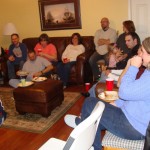Replay: Looking forward to a Super Bowl party
Ironically, two years ago, I wrote a post called “Looking forward to a Super Bowl party.” And, guess what I’m doing this weekend? I’m looking forward to a Super Bowl party again! I think I know which teams are playing this year, but I’m not certain enough to type it here without looking it up. I love football – mainly college football. I don’t watch much professional football. But, I love Super Bowl parties!
Are you looking forward to a Super Bowl party? Why?
——————————————-
Looking forward to a Super Bowl party
I understand that we’ve been invited to a Super Bowl Party by some good friends this Sunday night. I’m really looking forward to this party. Actually, I look forward to any party involving our friends and family.
Yes, the Super Bowl will be on the television, and we’ll laugh at some of the commercials.
But, my main purpose in going to the Super Bowl Party has nothing to do with the football game or the commercials. Instead, I’m looking forward to building and deepening with relationships with people who are at the party.
I never know what will be discussed during a party like this… but there are always discipling relationships… both for me to help someone else grow in maturity in Christ and for someone else to help me grow. This is what I’m looking forward to the most!
Sharing our life in Christ together and the mission of God
On this blog, I primarily focus on the gathering of the church… that is, times when believers gather together with one another.
These times are extremely important to the life and maturity of the children of God. We need one another, and we need to spend time with one another – or, as I like to say it, share our lives with one another. I believe this is part of the mission of God – seeing his children grow in their understanding of him, their trust in him, their unity with one another, and their way of life in demonstrating who he is.
However, there is another extremely important aspect of our life in Christ: taking part in the mission of God toward those who are not (yet) followers of Jesus Christ.
Last week, I wrote a couple of posts about “organic church life.” But, what about “organic church life” towards those who are not in Christ? How does our relationship with God and with one another stretch out to those who are not (yet) part of God’s family?
I’ve written about this some before, and I will probably write about this more in the coming weeks. But, for now, I want to ask you this question:
Do you have any examples of how sharing your lives with other brothers and sisters in Christ resulted in a positive impact for Christ among those who are not (yet) followers of Jesus?
When leaders guide you off the path
My son, his girlfriend, and I were running on the roads in our neighborhood. There is one point where a new cul-de-sac comes very close to a middle school near our home. We stepped off the road and ran down a path through the woods to the parking lot of the school. We ran around the parking lot, then headed back to the path to our neighborhood.
But, it had gotten darker, and I missed the path. We ended up running through the woods for a few feet.
Last weekend, I went on a trail run with a few friends. Three of us (the old three) stayed together while some of the younger guys ran ahead. We were taking turns leading on the trails.
Suddenly, we found ourselves off the trail and running down a hill into the woods. We turned around and made our way back onto the trail and continued our run.
I offer these two examples to make this point: Occasionally, even when leaders have the best of intentions and even when they are doing the best they can, they will lead us off the path. We end up in a place where we are not supposed to be.
The problem is not in having leaders. Scripture speaks of leaders (some prefer the term guides, which is fine). We will have leaders, whether they are recognized as more permanent leaders or they are temporary leaders for a specific time or project. Whether a group is more or less organized, there will be leaders.
And, guess what? Those leaders will make mistakes. No one is perfect. Even when someone is attempting to follow God and helping others follow God, that person will make mistakes.
This leads me to a very important question: What do we do when we realize that a leader (or a group of leaders) has guided us off the path?
Obviously, there are several ways to answer this question, and I think the way that we approach the answer tells us alot about what we think about leaders among the church, the work and responsibility of the church as a whole, and the presence of God with his children.
So, what would you do if you realized that someone has led you off the path? What if this mistake did not affect only you, but others as well?
How would this mistake affect your attitude toward the person(s) leading you?
How would you expect the leader(s) to respond when others realize that they have led them off the path? How should they respond if they do not believe they have misled people?
Again, I think these are very important questions that are rarely considered among the church. However, I think the mistakes in leadership happen often, even among those who are godly and who are genuinely seeking to help others.
What if you just have no time to spend with other people?
My friend Eric at “A Pilgrim’s Progress” is in an interesting situation. He’s written about it before, but he explains more in his post “No Time for Organic Church.”
You see, Eric quit his job as a full-time, vocational pastor for a local church organization several months ago. He prayed for employment for a long time (at least, a long time being unemployed), and God provided a job. However, he has to work long hours at this job – often working many overtime hours each week.
As he explains:
Because of this, our Sunday gatherings are extremely special to me. This is about the only time I get to see my friends. This is not by choice. It is a consequence of schedule. When we get together on Sundays, I find the time to be a wonderful, refreshing time of fellowship. I wish this could happen throughout the week, but right now that is not a possibility…
You may be in some sort of life situation that is keeping you from what you hope for as far as church is concerned. I want to encourage you. God’s grace is immense. He knows our hearts. He will also provide for fellowship in ways we don’t often expect or understand. However, as I’m learning, God’s timing is often far different from ours.
Someone could understand my posts last week about “organic church life” as a condemnation or admonishment of Eric and his situation. They are not intended that way at all.
Eric desires to share his life with others, but, in his wisdom, God has not provided that time. As Eric says, this is a time to trust God and rely on his grace.
My posts are meant as an encouragement to those of us who have time, but choose to spend that time on ourselves instead of sharing our lives with others.
So, if you find yourself in Eric’s situation… trust God and be patient. He knows what you need and when you need it… even if you think you need it now. 🙂
By the way, what do you think other brothers and sisters can do to help Eric during this time?
Guest Blogger: What is Authentic Church Experience?
I’ve invited several people to write “guest blog posts” for this blog. There are several reasons for this: 1) To offer different perspectives. 2) To generate even more discussion and conversation between blogs. 3) To introduce other bloggers to my readers.
(If you are interested in writing a guest blog post, please contact me at aknox[at]sebts[dot]com.)
Today’s post was written by Robert. You can follow Robert at his blog “A Bally Mennonite Blogger” or on Twitter (@tristaanogre).
————————————
My first attempt at defining an Authentic church experience was 1100+ words long. This is not too surprising, actually. I mean, we’re talking about something that is the body of Christ and all that goes along with it. How many thousands of words are in the New Testament of the Bible that attempt to describe who Christ is and what the community of faith looks like? And I’m trying to squeeze it into just a couple of hundred words. Let me see if I can sum up.
First of all, what church is not: it is not a business, an institution, an organization, a formalized religion, or anything like this. Now, there are times when a church needs to do stuff like one of these other things, but church is not that. As I said above, church is the body of Christ and this means that there are three characteristics that are part of the church.
1. Not Native – Jesus was/is God come down here to this little ball of rock, water, and dirt. He was extraterrestrial, alien, weird, bizarre, strange, and deviant. What this world is, Jesus is not. He stands out as different in the way he does things, the kinds of words he uses, and the way, generally he understands life. As the body of Christ, this is also what the church is supposed to be. We are to think, act, talk, and do things radically different than anything that seems “natural” to humans. When it comes to the rest of the world, to borrow a phrase from one of my favorite songs, we’re “Jesus Freaks”.
2. Native – “Now hold on,” you say. “Didn’t you just get done saying how Jesus is NOT native?” Yeah, I did. But that’s the really cool thing about Jesus. He isn’t native to this world and he spent a lot of time showing people this strange, weird, bizarre way of looking at and doing things that is completely out of this world. But in order to show people that it is possible for them to do it, too, he needed to become one of them. He became like people, experiencing everything they experienced, and showed that, in spite of all the stupidity that is our world, it is possible to do things differently and, in fact, it’s actually BETTER to be that way. And he proved it, even to the point of dying and coming back to life. “See?” he says. “You can be weird and look at the amazing stuff that happens when you are.” As the body of Christ, the church is called to be native as well. There will be laughter and tears, births and deaths, joy and pain, and all the messiness that comes from being human beings. Like Christ, we need to be incarnations of that holy other. We need to be show that there is flesh there, too, and that we are this weird blending of this “other” way and human beings. This means that there will be people with purple hair and piercings and people with head-coverings and plain clothes. There will be all manner of different interests, perceptions, and preferences all mixed together in a chaotic mess. And that’s a GOOD thing because it means we are actually native enough that, in the midst of our mess, we act weird… you know, like loving each other in our disagreements when everyone else says we should split… and that weirdness gets the attention of the world around us so they say, “Wait a minute. What’s going on here?”
3. Sent – All this Native/Non-Native stuff means nothing if we keep it to ourselves. Lock it up in a church building on Sunday morning, make it only visible for a couple of hours in an obscure location, and don’t let on that you exist, and no one will ever know. Again, look at Jesus. He could have stuck around the temple in Jerusalem and expected folks to come to him. But people didn’t really pay attention to him because he was some holy guy up on a hill somewhere. They sat up and paid attention because he ate with them, sat with them, cried with them, laughed with them, walked with them, and talked with them. Now, Jesus did go off on his own on occasion to pray and commune with God. He needed time to re-center himself, to reconnect with God so he didn’t lose track. But the real work was done when he was sitting at a well, walking down a street, going through the city gates, etc. The church, as the body of Christ, should take note of this. We do a pretty good job of getting together regularly to focus on God and on who he is and what he has in mind for us. But we’re pretty lousy, generally, about getting out there and doing the real work. There are folks who do stuff, but think about how much energy, money, time, and resource is spent on a few hours of one morning on one day of the week. What if we spent the same amount of resource, proportionally, on the other 6 and a half days of the week? Think about it. As the body, we’re not supposed to be stuck behind walls. What were Jesus last words? “Go, into all the world.”
So, what is the authentic church experience? It is a bunch of weirdos and freaks who break every mold of the world but are still very much human. And this bizarre bunch of people interact daily, moment by moment, with that world, as an intimate demonstration that life can be different, that what we experience is not all there is, and that there is something better in store.
Replay: Teaching in the context of living
Three years ago, I wrote a post called “Teaching in the context of living.” The post was inspired by a conversation that I had with a young man who I had recently met. The young man loved to listen to his pastor teach/preach, but also recognized that something very important was missing. Since he did not actually know his pastor, he had no context for what was being said. The “teaching” was in word only.
I thought this post would also go along well with the “teaching workshop” that we’re currently going through on Sunday mornings.
——————————–
Teaching in the context of living
Several days ago, I had the opportunity to have lunch with a young, single guy who has been meeting with us on Sundays for a few weeks. In the course of the conversation, he said that he wanted to talk about ecclesiology. Even though I’m not really interested in that subject (ahem), I was cordial to his request.
He began to talk about the church that he had been part of. He was not talking negatively about the church – in fact, he praised the church for what it was trying to do, and he praised the pastors and leadership. He said that he really appreciated the main pastor’s preaching, and he usually agreed with him.
Then he said something that I’ve been thinking and writing about for some time, but it was encouraging hearing it from someone else. This young man said that while he enjoyed the pastor’s sermon, he did not have a context in which to understand what the man was trying to teach.
I asked my new friend what he meant. He said, “My only relationship with this pastor is through a 30 minute sermon on Sunday morning. I don’t know anything about his life, or his family, or the way he treats his neighbors, or anything else. I only know what he tells me during his sermons. There is no relational context for learning what he is trying to teach.”
As I continued to talk to this young man, and to hear his heart for learning through relationships as well as through the spoken message, I couldn’t help but think of the examples that we have in Scripture.
Notice, for example, what Paul tells the elders from Ephesus:
And when they came to him, he said to them: “You yourselves know how I lived among you the whole time from the first day that I set foot in Asia…” (Acts 20:18 ESV)
Also, this is what Paul reminds the believers in Thessalonika:
For you remember, brothers, our labor and toil: we worked night and day, that we might not be a burden to any of you, while we proclaimed to you the gospel of God. You are witnesses, and God also, how holy and righteous and blameless was our conduct toward you believers. (1 Thessalonians 2:9-10 ESV)
He tells the Philippians:
What you have learned and received and heard and seen in me – practice these things, and the God of peace will be with you. (Philippians 4:9 ESV)
The obvious exception to this pattern seems to be that when Paul wrote to the church in Rome, he had not been to Rome, although he seemed to know many of the believers there. However, even in this case, Paul later lived among the Roman believers for at least two years (Acts 28:30).
In other words, Paul did not intend for his words alone (neither his spoken words nor his written words) to make up the extent of his service to the people of God. He recognized the importance of living with the people as part of his work. He shared his life with them, and they shared their lives with him. Paul had much, much more than a “speaking ministry” among the people.
His words then often pointed back to his example of living and working among the people.
Today, too often, teachers spend very little time with the people they are attempting to teach. As my young friend said, there is no context for their teaching. This is not discipleship or teaching in the biblical sense, or in the sense that either Jesus or Paul modeled for us.
Instead, we need to live with the people that we hope to teach. Our teaching must be in the context of our living if we hope to see transformation – both our own transformation and transformation in the lives of others.
Why is it so difficult to find organic church life?
In my post “People want real examples of organic church life,” I linked to a post by Dan at “Cerulean Sanctum” called “Is organic house church a myth?” In that post, Dan expressed his frustration at not being able to find “organic house church” in his city like he sees described in Frank Viola’s books.
In this post, I’m going to try to answer the question, “Why is it so difficult to find organic church life?” I need to point out a few things before I start. First, this post is not directly related to Dan’s post. That is, I am not responding to Dan’s search for organic house church. I do not know how he looked or who he talked with. So, this post will not be specifically about his search.
Second, I’m using the phrase “organic church life” instead of the phrases “organic church,” “house church,” or “simple church” or any combination. And, I’m using the phrase “organic church life” for a very specific reason. When I write about “organic church life,” I’m not talking about a certain church gathering, or a certain type of meeting, or a certain group of believers, or a certain method of organizing (or not organizing). Instead, I’m talking about believers sharing their lives with one another as they also share life in Jesus Christ.
As we think about my second point, we can also begin to understand why this “organic church life” may be difficult to find. It is not a place, or an event, or even a group that we can point to. It is a way of life. There are people who meet together only in homes who share organic church life in Jesus Christ. There are also people who meet together only in homes who do not share organic church life. In the same way, people can meet in church buildings and share organic church life (or not).
A group may have a specific weekly meeting (or more than one) and share this kind of life in Christ. Or, they may not have a regular weekly meeting. Then again, a group may have a weekly meeting (or even meet together more often) and yet not share their lives with one another in Jesus Christ.
When these groups do get together, it is relational not structural. Thus, as the relationships change or the people involved change, then the group will change as well. It is fluid and dynamic.
The group that meets together today may be completely different than the group that met together last year (or month) and may be completely different than the group that will meet together next year (or month). This does not mean that the group collapsed or fizzled out or ended or anything else that we might use to describe the end of a more organized or structured group.
Also, even when a group such as this is sharing life together in our own neighborhood, we may never notice it. It can be hard to point to and even to distinguish from overlapping or tangential groups. There may not be a sign, a website, a corporation, a yellow pages entry, or any other traditional identifying marker.
These groups (if they are sharing life in Christ) will also be serving others, but that service may not be directed toward the person looking for a group such as this. So, while we can often recognize organic church life because the people are serving others together, their service may not always be readily apparent.
So, what do we do? We want to find organic church life, but it’s difficult to find (for the reasons listed above as well as many other reasons). Do we just give up? No.
We begin sharing our own lives (in Christ) with the people that God has already brought into our life. Some will push us away. Fine. We cannot control how other people respond to us. Others, however, will also be longing for this kind of fellowship in the Spirit. And, as we find these people, we begin to grow and serve and disciple and encourage and share and give and teach and eat and learn and admonish and pray and hope together.
This is organic church life. It is within us. And, we can share it with others.
People want real examples of organic church life
A few months ago, I was reading a blog post from someone on the “cutting edge” of the organic church movement – if it’s a movement. The person asked what his readers would like him to write about, and I said, “Right about real life example of what it means to be part of an ‘organic church’ and how it affects things like gathering together, discipleship, giving, evangelism, teaching, etc.” (paraphrase)
Earlier this week, Dan at “Cerulean Sanctum” asked “Is Organic House Church a Myth?” Why would Dan ask that question? Because he sees so few real life examples in his city. He has been reading through some of Frank Viola’s book, and he loves the descriptions that he finds there. But, why can’t he find them in real life?
Dan writes:
I say this because the more I attempt to locate the type of organic/house church that Viola says has been blessing his life for the last few decades, the more it seems like the fabled destination of another famous musical, Brigadoon…
I live just outside a metropolitan area of 2.2 million people that is heavily churched. When Christian pollsters and church resource magazines publish info about influential institutional churches, this area contains a disproportionately large number of them. Which is why I continue to scratch my head at the utter lack in such an area of anything resembling Viola’s ethereal organic church. Hasn’t anyone burned out of those institutional megachurches and fled to the supposed refuge of an organic church?
Reading the testimonials of organic church members included in Viola’s books makes my heart ache. But like so many tales one hears in the American Church today, it seems like those beautiful stories are happening in some hazy, distant place, almost like Narnia, except even harder to find.
I understand much of Dan’s frustration, and many of my readers have shared the same frustrations and difficulties in finding the kind of shared life in Christ that “organic church” books describe.
Now, I know that the type of shared life that Viola (and others) describe exist, because I experience it every day. I also know that this kind of church life can be found among the members of more traditional or institutional churches. However, that doesn’t help others who are seeking fellowship with others in this way. It still seems elusive.
As you can probably tell from my previous paragraph, I’m not interested in some new model of church that is labeled “organic church” as opposed to some other brand or model of church. Instead, I’m interested in brothers and sisters in Christ sharing their lives together in Jesus Christ in such a way that he is able to work through them as he desires – often unorchestrated, unplanned, unrehearsed, and unscripted.
Unfortunately, this kind of life cannot happen (only) in a church gathering… even an “organic church” gathering with open participation. This kind of life happens day in and day out when people spend time together, care about one another, give and help one another, and serve others together.
To be honest, I’ve found this kind of “church” more difficult to locate than “organic church.” There are several websites that list local “organic churches” or “house churches” in your area. However, tacking the label “organic church” or “house church” onto a group – or even meeting in a house or having an open participatory meeting – does not indicate that the people involved actually share their lives with one another.
However, these groups do exist. I’ve communicated with many people who live like this day in and day out with other Christians. I’ve even had a few opportunities to get together with representatives of different groups who gather around our area.
But… I still agree with Dan. This type of church life is difficult to find, and extremely elusive – even where it does exist.
Why do you think it is so difficult to find “organic church life”?
(By the way, I will offer some of my own answers to that question in tomorrow morning’s blog post.)
Community in Christ: It’s still not about perfection
Yesterday, I published a post called “Do we want community? Really?” In that posts, I quoted some questions that Arthur asked about community and our own selfish desires.
In response, I had a very good discussion with Bob over on Facebook. (Follow this link to view the discussion.)
Bob made some very good points. For example, he said:
I think that it is tempting to read the early chapters of Acts and imagine what community really looks like. Yet I imagine that all present did not experience community in the ways that we think. Sometimes community comes in strange places as we get to know the people that we work with and live close to. And sometimes we are able to share our lives and our souls with kindred spirits.
This is a great point! While Luke gives us a good description of the community that the early church shared, we should not misread what Luke says. Obviously, even that early community in Christ was not perfect. While Ananias and Sapphira (Acts 5:1-10) were probably extreme examples, we can know that there were problems among this early group of believers. Why? Because they were human. They were not perfect; therefore, the community that they shared with one another was not perfect.
Of course, as Bonhoeffer said (and as I quoted in my recent post “The Church: Not an ideal but a divine reality“), it is in this imperfect community that we discover God’s grace and that we learn what true sharing is all about.
We share our lives with one another – in spite of our imperfection and in spite of the imperfect way that we relate to one another because of those imperfections. Then, we help one another – mutually – to grow together in maturity in Jesus Christ. He is our goal as well as the only way to reach that goal.
In Acts 2, Luke provides a good example of what Jesus Christ did among one group of believers as they submitted themselves to him. Was it perfect? No.
In the same way, the Holy Spirit will mold us into a community in Jesus Christ as we submit ourselves to him, in spite of our imperfections – individually and corporately.
We never wait for perfection (from ourselves or others or our group) before we share our lives with one another.
Do we want community? Really?
Arthur at “The Voice of One Crying Out in Suburbia” raises some great questions about community in Christ in his post “Book Review: Why We Live In Community.”
The post begins as a review of an e-book by Eberhard Arnold called Why We Live In Community. But, reading the book and thinking about the topic leads Arthur to ask some very important questions.
For example, consider this part of his post:
Most importantly, why don’t we live in community? Could it be that we love our autonomy, our freedom, our wealth and possessions more than each other? Is the idea of that sort of closeness and openness in this life scary to people who affirm in theory that sort of relationship in eternity? Perhaps most troubling, could it be that we fear living community in whatever shape it takes because we don’t really believe what we read in the Bible, just as we don’t seem to believe so much of what Jesus taught or how He lived or what He commanded? Is it just easier to live lives of religious observance and to find ways to nitpick and divide from one another so that we can justify our disunity? These are troubling questions but they are hammering me.
I agree with Arthur: these are troubling questions. I’ve wrestled with many of these questions, and continue to do so from time to time.
Why do you do when you find that you really don’t want to live in community in Christ with others?










